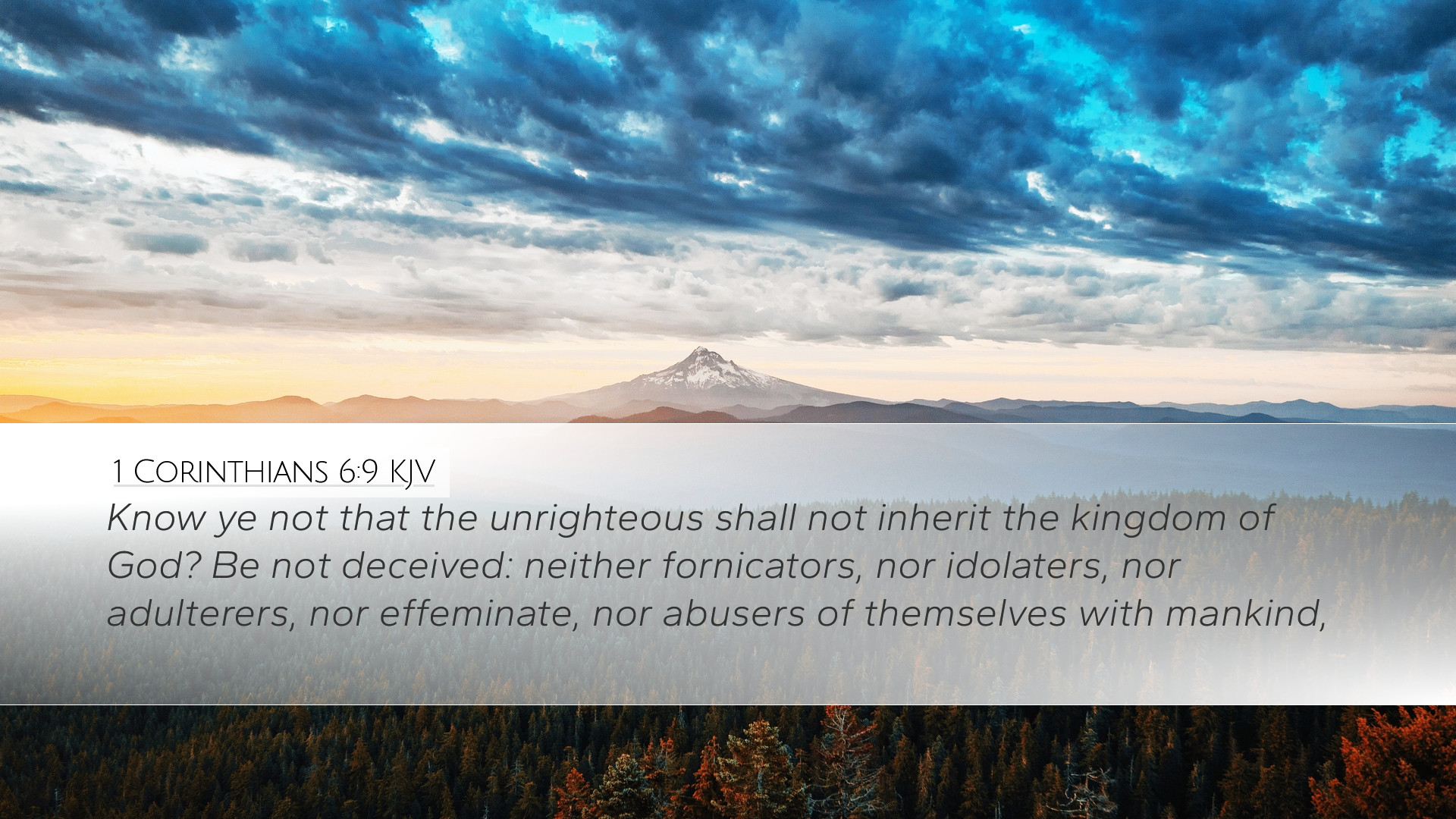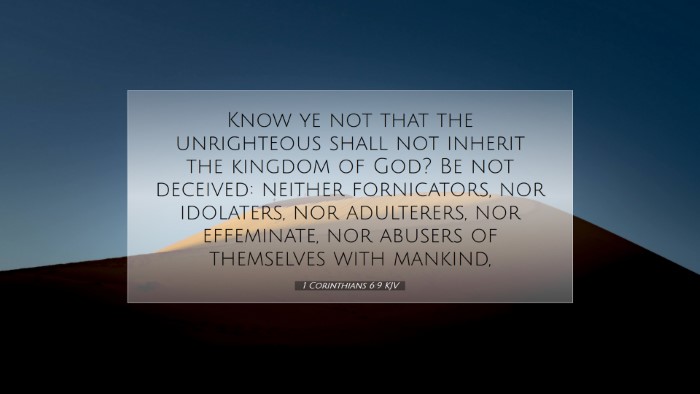Commentary on 1 Corinthians 6:9
Verse Text: "Know ye not that the unrighteous shall not inherit the kingdom of God? Be not deceived: neither fornicators, nor idolaters, nor adulterers, nor effeminate, nor abusers of themselves with mankind."
Introduction
The passage in 1 Corinthians 6:9 serves as a stark reminder of the moral integrity required of believers. Paul addresses the Corinthian church with clarity and conviction, emphasizing that certain behaviors are incompatible with the Christian faith and disqualifying for inheriting the kingdom of God. This commentary will delve into insights from notable public domain commentaries, examining the implications of the text for believers and the broader Christian community.
Contextual Background
Corinth was a significant city in the ancient world known for its cultural diversity and moral laxity. The Christian community there faced numerous challenges, including rampant immorality and societal pressures. Paul’s letters frequently address these issues, providing instruction, correction, and encouragement. Understanding the socio-cultural backdrop is essential in grasping the weight of Paul’s admonitions.
Exegesis of Key Terms
- Unrighteous: In the Greek context, the term signifies those who act unjustly or violate the moral law. Matthew Henry highlights that Paul refers to a distinction between the righteous, who follow God’s commands, and the unrighteous, who indulge in sin.
- Shall Not Inherit: This phrase indicates a definitive exclusion from God's kingdom. Albert Barnes emphasizes the certainty in this declaration, underscoring that the practices mentioned are serious transgressions against God’s design.
- Fornicators: This term pertains to those involved in sexual immorality outside of marriage. Adam Clarke points out that this sin reflects a disregard for God’s intentions for sexual purity.
- Idolaters: Those who worship idols or put anything above God. Barnes notes that idolatry is a profound betrayal against the exclusive worship required by God.
- Adulterers: This term addresses those who commit infidelity in marriage. Henry elaborates on the severity of infidelity in breaking covenant relationships, which is a serious affront to God’s covenant nature.
- Effeminate: This term refers to a category of immorality involving unnatural behaviors. Clarke elucidates that it indicates a deviation from the natural order intended by God.
- Abusers of Themselves with Mankind: A more direct reference to homosexual behavior. Paul is clear in condemning practices contrary to God’s created order.
Theological Implications
This scripture engenders rich theological discussions centering around sin, grace, and salvation. Below are key insights drawn from the commentaries:
- Sin and Its Consequences: Henry emphasizes that the unrighteous are not merely those who commit specific sins; they embody a lifestyle of rebellion against God’s laws. This extended view of unrighteousness suggests that the character of a person, rather than isolated acts, determines their standing before God.
- God’s Justice: The assertion that the unrighteous will not inherit God's kingdom reinforces God’s justice. Barnes argues that God's kingdom is a realm of holiness, and thus cannot accommodate those who persist in sin.
- Call to Repentance: Implicit in Paul’s admonition is a call for repentance. Clarke notes that while sin is highlighted, the overarching theme of redemption through Christ should propel believers towards transformation.
Pastoral Applications
For pastors and church leaders, this passage presents both a challenge and an encouraging opportunity for ministry:
- Preaching Holiness: Pastors must boldly proclaim the necessity of living righteously in accordance with God’s Word. The warning against these sins serves as a foundation for preaching holiness.
- Encouraging Accountability: Leaders are called to foster a culture of accountability and discipleship within the church. Encourage congregants to confess and seek help for struggles with sin.
- Emphasizing Grace: Balance the warning against sin with the message of grace. Clarke’s commentary suggests that while Paul warns against unrighteousness, he offers hope through Christ's redemptive power.
Conclusion
1 Corinthians 6:9 encapsulates a crucial aspect of Christian teaching—the assurance that while sin exists, living in righteousness is paramount for belonging to God’s kingdom. Paul’s words resonate across centuries, challenging believers to examine their lives earnestly and encouraging them toward a faithful walk with Christ.
As this commentary illustrates, the insights from public domain scholars deepen our understanding and application of the Scriptures. It is imperative that both individual believers and the collective church embrace the high calling of holiness and the transformative power of grace.


